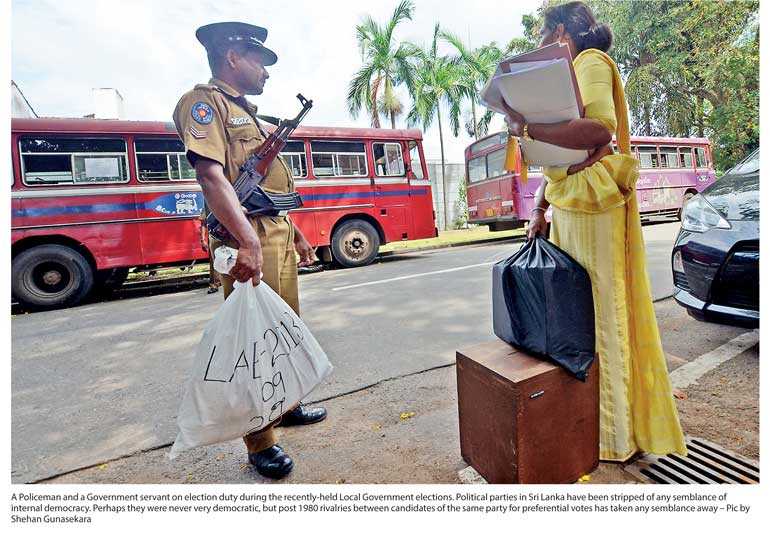Tuesday Feb 24, 2026
Tuesday Feb 24, 2026
Friday, 27 April 2018 00:00 - - {{hitsCtrl.values.hits}}

 As Churchill had said, democracy is the worst form of government except for all those other forms that have been tried from time to time. Well, he had not seen the worst, which is the transplanting of democratic institutions in countries which are still rooted in their not so distant feudal past. Sri Lanka is a case in point.
As Churchill had said, democracy is the worst form of government except for all those other forms that have been tried from time to time. Well, he had not seen the worst, which is the transplanting of democratic institutions in countries which are still rooted in their not so distant feudal past. Sri Lanka is a case in point.
Internal democracy of parties is the foundation of democracy in a country. Political parties in Sri Lanka have been stripped of any semblance of internal democracy. Perhaps they were never very democratic, but post 1980 rivalries between candidates of the same party for preferential votes has taken any semblance away.
Current parties are nothing but feudal arrangements with leaders who are difficult to dislodge. They maintain themselves with the support of hand-picked modern-day feudal lords called the electorate organisers.
Most of these organisers have no particular allegiance to the party platform, even if the party has one. Their success depends on how well they keep the lid on the bottom and curry favours with the top. Even if these organisers do not receive sufficient preferential votes to stay in the game, they have ways getting in through the National List.
The middle class in our society behaves like the proverbial English bride, who was advised to close her eyes and think of England on her big night. Our middle class holds its collective noses and go through the motions of elections, thinking of a little better Sri Lanka.
Talking about elections, with three Provincial Councils overdue for elections and three more coming due in September, it will be election time soon, if the Government is genuine. The ground is nearly ready with new legislation, but after the chaotic aftermath of local elections under the new MMP system, party leaders seem to be jittery.
The drafters of the local elections Act and their Parliamentary colleagues took a free hand in removing elements which they thought were unfavourable to each and added those they thought were favourable, but these opportunistic moves have backfired. The party secretaries wanted the power to handpick the nominees from Additional Lists. This is contrary to the international practice of having Additional Lists ranked and closed prior to the election. The ensuing scramble to be returned as Additional Members could not have been pleasant.
Party leaders also retained the power to name the Chairman and Vice Chairmen if the party got a majority of the votes in a local Council. Contrary to calculations, SLPP, a splinter a group stole the votes from the governing UNP and/or the SLFP. As a result, the election of Chairman and Vice Chairman in most Councils were drawn out affair with high likelihood of underlying councillor buying.
Now some politicians seem to want to go back to old PR preferential voting system for the upcoming provincial elections. Some are suggesting changes that don’t fit with an MMP architecture. Such actions, if any, should be met with the response – you passed the laws just the other day. You put in motion a delimitation committee and all that. You can make some minor adjustments, but you better lie on the bed you made.
Such a response is not a frivolous one, because the PC Elections Act is based on an established electoral architecture. Every system has its pros and cons. Problems if any, are due would due are in poor formulations and drafting which can be corrected.
Of the 193 members of the United Nations, no two countries have exactly the same electoral system, but all existing systems are variations of four basic architectures. These are Plurality systems, Proportional systems and the two Mixed Method systems known as Mixed-Member Parallel and Mixed Member Proportional. The proportionality of the system increases from left to right.
In the plurality method of representation, a party that gets one vote more than another in an electorate (called a first-past-the post or an FPP win) gets elected. In the Proportional representation method Parties are allocated seats in proportion to the votes they received.
Starting off with a plurality system, but having moved to a Proportional system in 1978, Sri Lanka cannot turn back to the Plurality method. Either of the two Mixed-Method systems can be adapted to Sri Lankan conditions.
We already have legislation for an MMP system in place and we have practical knowledge of how the system may or may not work. Therefore, at this hour we should focus on the pros and cons of the PC elections Act as it is legislated and look for minor amendments.
The Mixed-Member Proportional method allocates seats to Parties within a proportional framework, but uses a mixed mode to select individuals to occupy those seats. (In contrast, in the simple PR system with Open lists, a second preferential ballot is used to select individuals). In MMP, an electoral district is divided into electorates numbering no less than half of the Members to be elected, and those that win FPP in those electorates are returned first. If seats won proportionately by any party remain unfilled, they can nominate individuals from the Additional Lists.
This mixed-Member method fulfils the election promises of the President elected in January 2015 and the Government elected in August 2015. Both promised to (1) stay close to Proportional representation (2) get rid of the divisive and expensive preferential voting system, and (3) ensure that there is a representative accountable to a given geographic area.
As demonstrated by the events before and during and the election, government has kept to its promise in all three regards. However, as the after-election scenario unfolded, the problems of limiting electoral designs to election manifestos became apparent. Election manifestos do not capture all the critical features of a good electoral system. Most political theorists agree that an electoral system should be judged by how they manage the representation v governability tension and sustain the integrity of the party system.
MMP is conducive for representation for small parties. However, unwise polices can lead to runaway representation. The Local election amendments removed thresholds for parties to qualify, enabling proliferation of small parties. This can lead to ungovernable situations.
In the case of women’s representation, an unrealisable mandate of 25% representation in the final Council has made women’s representation a target for criticism. The increased size of the Council too has been wrongly attributed to women’s quota. In truth, the women’s quota could have been accommodated within the existing size of the councils.
Representation of minorities in constituency seats is difficult in areas where minorities are dispersed. The Additional List is the best place for dispersed minorities because they can represent minorities across an electoral district. However, in MMP systems, a winning party is likely to get zero Additional places, if they did too well in FPP races, leaving those who were expecting to be represented through Additional List of the winning party sorely disappointed.
Another pertinent issue is the complaint that those who had nothing to do with party are nominated as additional candidates and they get a free ride to the Councils. This complain is strongly voiced by those who lost FPP races by small margins. This is a larger problem where features of the electoral system are not compatible with local attitudes. This is also a demonstration of the fact an electoral system is not just about the arithmetic to assign seas.
How the candidates are selected is also a part of a comprehensive electoral architecture. In the US, presidential candidates are selected through a complicated set of Primary elections to avoid the problem undemocratic methods selection by party bosses.
More often than not, PR systems lead to split councils. The prevailing political climate can exacerbate the problem. For example, the lack of a majority for in most Councils in the recent election would have come up even with the old PR system, since a major party such as the SLFP split into two. Bonus seats are typically given to the winning party to alleviate the majority problem.
Although some argue that governing party without a majority can function by consensus building with other parties, in warped democracies like ours, consensus is often bought rather than built through persuasion.
The foundation of a democracy is a robust party system. A political party is a group of individuals who are organised around a political ideology and policies and programs reflecting the ideology. In the long term, an electoral system should be judged by the health of the party system. Too many parties in a Council can lead to dysfunction. Dominance by two big parties with barriers to entry to others can lead to disruptive actions outside of the Council. More importantly, lack of democracy within parties makes democratic institutions meaningless.
In regard to the health of the party system, MMP election process gets marks for avoiding intra-party rivalry during the election campaigns but there are other issues for consideration. For example, the selection of candidates, nominating additional candidates as councillors, selecting a Chairman for a Council too are part of the electoral process. These processes should be designed not to compromise the unity of the party around policies and principles. A party may change its principles and may even splinter, but it should be as a result of political factors, not structural factors such as an electoral system.
The Provincial Council Elections Act is an improvement to the Local Government Election act which was enacted a few months before. For example, it defines the number of councillors and electorates to be carved out, avoiding free-for-all increase of electorate to suit political whims.
As in any an MMP system, dispersed minorities will not get a chance to select a member by First Past the Post because, the ethnic relations in this country are such that in FPP contest only candidates form the major ethnic community will have a chance in electorates where minority numbers are small. Therefore it would be advisable to create bonus seats for each district with the understanding that they are for the purpose of representation to underrepresented groups.
Women’s representation should be assured through opportunities for candidacy, not assurance of a certain number of seats in the Council. In that regard, the present set aside of 10% should be increased to 25% and List candidacy should be 50% as now. Zipping of a list or alternating males and female in a ranked list is the established practice for assuring women’s representation.
In the Sri Lanka context, those who lost in close FPP contests would not be happy about those from List getting seats. In Japan, the Constituency candidates are co-listed in the Additional Lists. If they win the Constituency, the names are removed and the candidates ranked according to the percentage of votes they received.
Dr. Laksiri Fernando criticises this idea of giving recognition to ‘best losers’, but I think in Sri Lanka we should accommodate them in a limited way. One solution would be to allow room at the top of the list for 20% or so seats to those came close to winning their single member constituencies. The rest of list should be zipped, and closed.
There are many other small adjustments that can be made to the existing PC Elections Act, but all these adjustments should be scrutinised to see that don’t harm the long-term objective of maintaining a healthy political party system.